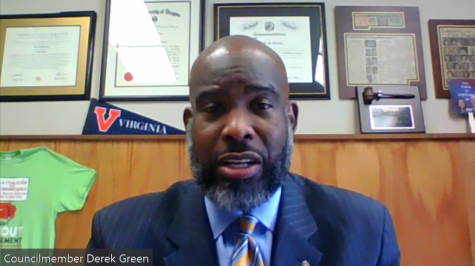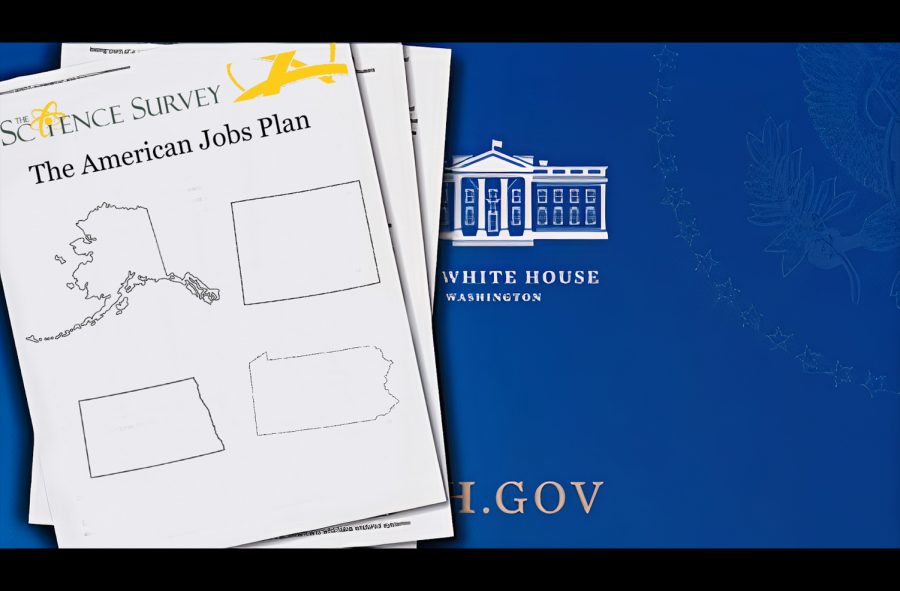Biden’s Infrastructure Plan: A Nationwide Perspective From Six Elected Officials
The American Jobs Plan Views of Key Representatives
From Alaska, Wyoming, North Dakota, to Pennsylvania, our representatives voice their opinions to ‘The Science Survey’ on the Joe Biden infrastructure plan.
The Joseph Biden administration introduced The American Jobs Plan, initially a $2-trillion infrastructure proposal that attempts to address the growing call for further investment and revitalization down to the local level. It is important, now more than ever, to work towards transformational efforts in order to combat the social-economic issues exacerbated by the Coronavirus pandemic and the issues that will arise in the decades to come. However, questions still remain on whether or not this is the right approach to mobilize the country, and, if so, how the funds should be best allocated.
As this bill will need bipartisan support from across the nation in order to succeed, it is vital to understand the viewpoints of various stakeholders, especially those who are elected leaders and representatives.
Thus, as a reporter for The Science Survey, I reached out to three Republican and three Democratic representatives in key states such as Alaska, North Dakota, Pennsylvania, and Wyoming, on how they feel about the proposal. These states are collectively large stakeholders of the infrastructure bill, as they represent over $960-billion dollars in total gross domestic product and because their representatives will be actively voicing their concerns and support as calls for this proposal progress.
Wyoming
According to the 2021 Report Card for America’s Infrastructure, deteriorating infrastructure in Wyoming will make it increasingly difficult for the state to compete in the growing global marketplace. Driving on roads in need of repair in Wyoming costs each driver about $300 per year, and 7% of bridges are rated structurally deficient. Drinking water needs in Wyoming are an estimated half-billion dollars in statewide costs. Almost a hundred of its dams are labeled as potential major hazards and, beyond that, the state’s schools have an estimated capital expenditure gap of $149 million.
U.S. Senator Cynthia Lummis (R) from Wyoming
United States Senator Cynthia Lummis from Wyoming is actively working on the Senate floor with fellow Republican Senator from Iowa Joni Ernst and others, to call for further bipartisanship to work directly with the President in order to pass a bill to expand jobs and infrastructure across the nation. The package would be beneficial to Wyoming but could come at a large cost as the amount that should be spent on this is still up for debate.
In regards to the high annual costs for every driver on the road in Wyoming due to roads that need repair and the bridges that are currently structurally deficient, the United States Senator’s Communication Director Mr. Darin Miller has informed me that, “Right now, we have a Highway Trust Fund that we can’t actually trust. Since 2008 we have been relying on General Fund transfers to pay for our roads and bridges, instead of fixing our user fee model to keep the trust fund solvent.”
The Senator further commented, “While much divides Congress these days, infrastructure, as that term is understood by most Americans, is a bipartisan issue. As such, one would assume President Biden would want to find some common ground in order to build relationships in Congress and address the needs of every citizen. Honestly, I am hard pressed to remember a time when infrastructure was not bipartisan,” she said. “In 2021, this should be no different. If President Biden wants to truly unite the nation, he can start by working with Republicans on the most basic bipartisan issues.”
Pennsylvania
The Pennsylvania Infrastructure report card 2018 rates the state with a C-, indicating that Pennsylvania has some of the oldest infrastructure in the country. Much of the infrastructure in Pennsylvania continues to operate far beyond the intended lifespan. All Pennsylvanians, including policymakers, must determine if they embrace the personal and economic benefits of a robust network of infrastructure. If it is ‘yes,’ they have to prioritize improving infrastructure. Solid infrastructure ensures the security and prosperity of Pennsylvanians.
Councilman Derek Green (D) from Pennsylvania
Councilman Derek Green was elected into the Philadelphia City Council in 2015. He serves on the board of the National League of Cities, an organization made up of mayors and council members from around the country. He also serves as president of the Pennsylvania Municipal League and as President of Democratic Officials, a group of mayors, council members, and aldermen. In regards to the American Jobs Plan, he said:

“The American Jobs Plan will also allow us to take what was started on the American Rescue Plan to the next level. It’s going to help us with significant infrastructure issues and challenges that we have in the city, in our more traditional infrastructure. I am someone who drives around the city quite a bit as an at-large member of the City Council and so I see a lot of the roads and bridges and other parts of the city that really need investment. And a number of cities not only here in Philadelphia but around the nation have really deferred making those types of capital investments
I know in talking with my colleagues, they all speak about the need to make real capital investments, that they have not had the resources to do, especially because of the pandemic. But even before the pandemic, many cities like Philadelphia really needed additional resources to make those real capital investments in infrastructure and that’s why seeing the American Jobs Plan as a real opportunity to do some real strategic investment in our city and also allow us to make some investments that are going to move not only cities like Philadelphia but a nation forward.
President Biden is having a very large broad conversation regarding infrastructure as part of the American Jobs Plan, but is also looking at infrastructure in a more creative way, such as looking at human infrastructure. So many people during this pandemic have real challenges in their ability to go to work because they did not have child care. So to look at that, infrastructure is so important for our economy and for us to be able to work, grow businesses, and have resources from our jobs that we can bring back to our home and spend in our communities. So I think it’s going to provide a lot of opportunities for a lot of cities around the country.
The American Jobs Plan provides a number of opportunities, not just in traditional infrastructure like roads and bridges. I like the new economy, not just new infrastructure, like electric vehicles or renewable natural gas and geothermal, but also things that you would not consider infrastructure like child care which is very important for our economy not only at a national level but also locally right here in Philadelphia.
There’s an opportunity for bipartisanship with the American Jobs Plan. The previous administration was also talking about infrastructure, although no infrastructure bill was put forth. But you also have to remember that President Biden is a creature of the Senate. He spent many decades in the United States Senate, which is a legislative body like the City Council. And part of the work of a legislative body is compromise. So I think when he says he’s looking for compromise, I think he is being honest and I think that is his goal.
I know he’s had a group of 10 Republican Senators that he has met with already regarding the American Jobs Plan at least. That group presented a counter infrastructure bill which is significantly lower than what President Biden proposed, but even after that conversation and after that bill was presented as a counter, President Biden was still consistent in saying that he’s willing to work with Republicans. And this is an opportunity for this type of conversation. I’m glad Senator Lummis made a statement that was made about that and I think there are some areas that we could compromise.”
Councilwoman Helen Gym (D) from Pennsylvania
Councilwoman Helen Gym was elected into the Philadelphia City Council in 2016 as an at-large member. As chair of Council’s Children and Youth Committee, she has helped lead a public schools agenda that contributed to the end of the 17-year state takeover of the Philadelphia school system, supported funding for pre-K programs, and restored nurses and counselors back to every public school. She established the city’s first legal defense fund for tenants facing eviction and the city’s first fund to specifically address youth homelessness. In regards to the American Job’s Plan, she stated:
“I support the American Jobs Plan particularly because the jobs are built around long-neglected and essential areas of both society and economy – rebuilding our public schools and expanding public transit, investing in internet and clean water, and raising wages for critical industries like home health care. The best way the American Jobs Plan can be improved is by turning it from a plan into a real life budget and a blueprint for the nation’s growth over the next decade.
I represent residents of the poorest large city in the nation. Since coming into office, I have campaigned for school modernization for a city where the average school building is 70 years old without air conditioning. In some schools, classrooms cannot even run smart boards at the same time without knocking out power in other parts of the building.
Because we don’t have air conditioning and some rooms can reach 90+ degrees in September and June, we start school weeks later than public schools in the suburbs. Many of our schools were shut down during the pandemic because they lacked appropriate ventilation. We have had children poisoned by lead and teachers poisoned by asbestos exposure. It’s a national disgrace and it is robbing generations of children their right to an equal education.
Campaigning for our schools isn’t the limit. I have had to lead major campaigns to ensure fresh water, demand internet access for students in schools, public transit affordability, and pay for home health care workers.
Because our federal and state laws are so terrible, Philadelphia has had to resort to leading on this ourselves, pioneering local laws for Fair Workweek scheduling, lead testing and expanding prevailing wage. But we shouldn’t have to do this alone.
The American Jobs Plan will finally make the federal government a partner in restoring investments in the basic infrastructure of life in Philadelphia. My constituents and the residents of this city will all benefit.”
North Dakota
According to the 2021 Report Card on America’s Infrastructure, the infrastructure of North Dakota is the backbone of the economy of the state. Infrastructure offers our most vital asset – the people – to make the nation and state more effective. North Dakota, famed for its people’s unshakeable work ethic, can position its next generation of employees through improvements to funding, asset management and innovative solutions to maintain, improve, and develop state infrastructure.
State Senator Doug Larsen (R) from North Dakota

Senator Doug Larsen is heavily involved in legislative decision-making surrounding infrastructure, as the vice-chair of the Senate Committee on Industry, Business, and Labor, while also a standing member on the Transportation Committee. He is also the proud owner of Apex Builders, Wingate by Wyndham Hotel.
“When I got elected to the ND state senate, I ran on the idea that the private sector drives the economy and that the Government tends to do few things better than the people do. Anytime you encourage (whether that is your purpose or not) to not work, you will have problems.
ND has not had an employment issue in quite a long time—our unemployment rate has bounced around 2% for about a decade. Often we have more job openings than unemployed. Now there are lots of reasons for this—our winters are tough on some, our urban areas would be considered rural by most, and for some there is “nothing to do.” But that aside, the population we have—largely are hardworking, family oriented people.
For some reason, the country’s economy boomed in the past 4 years—absolutely boomed. A global pandemic happened and now we are going to grow it again. If you were a cake baker in 2017 and developed a recipe that put your bakery on the map and for the next 3 years you were crushing it—then an event happened—say it was a street closure that lasted a year. It challenged your business and things declined—but then the street reopened. Things were a bit different—but the new normal started coming back. Now in the middle of the recovery, a new owner took over the bakery.
What should the new owner do to regain the prominence of the business that they had bought? Why would they not go back to the recipe that put the bakery on the map?
We are going to raise taxes on the very institutions that drive our economy in theory to pay for all of the money that we are giving out that was not asked for and is finally being rejected? The Government is here though to fix the job market
We are experiencing multiple energy issues in the country—the last administration seems to have that under control. We will use the energy we use—the biggest thing we can control is where we buy it from, does it come from the United States or from foreign nations? Seems to be a no brainer, but his administration—largely to satisfy his people, has waged war on that economic industry.
Yes, it has affected my state—negatively.
Stop giving it out, stop taking it—stop spending money you don’t have and stop doing things you don’t do well. If we don’t fix our addiction to spending money that has been made, it won’t end well for the US.”
Alaska
The Alaska Infrastructure report card of 2017 notes that Alaska’s infrastructure, which extends across over 663,000 kilometers and supports just over 730,000 people, is unique. There is no single means of transit in Alaska and routes are changed according to the time of year. Some communities have no access to indoor plumbing, although it’s too often by choice. Many rural villages in Alaska continue to need safe, efficient, and sustainable water and waste water systems, while even the most populous places are still learning how to handle solid waste every day in the subarctic.
Mayor Tim O’Connor (R) from Craig, Alaska
As the largest town on Prince of Wales Island, Craig is a hub for transportation, commerce, government and tourism for the island. The City of Craig was incorporated in 1922 as a second-class city under the laws of the Territory of Alaska. It became a first-class city in 1973. The Mayor of the City of Craig, Tim O’Connor, in regards to the American Jobs Plan, states:
“This bill is only 9% for real infrastructure. The real infrastructure money could really be used out here in the real world, but I fear this plan has more to do with political pay-back in a certain party. And therefore we won’t see much of the money where it is truly needed.”
Councilman Santa Claus (D) from Alaska
Councilman Santa Claus from North Pole, Alaska noted that he is not authorized to speak on behalf of the North Pole City Council as a whole. But prior to his Santa years, he was appointed by Mayor Lindsay to be his Special Assistant to the Deputy Police Commissioner of New York City. He earned my bachelors and masters degrees from New York University, where he also completed my doctoral coursework in educational communication and technology.
“Please note that I am not authorized to comment on behalf of our North Pole City Council. Also, our Council does not appear to have a role in the American Jobs Plan initiative. Should elements in the initiative address universal broadband access and/or water system safety, perhaps our Council would comment on that aspect of the initiative’s potential impact on our community of 2,200 residents.”
Ryan Ahmed is a Managing Editor for 'The Science Survey.' He wants to uplift communities and provide unique insight on current events around the globe...

